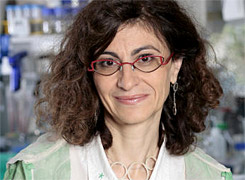Geneviève Almouzni, new Director of the Institut Curie in Paris, France and recent recipient of the FEBS | EMBO Women in Science Award, discusses the cutting edge of epigenetics, and shares some of her career advice for young scientists.
There are a lot of definitions of epigenetics floating around out there. Which do you prefer?
For me, it includes all of the things driving inheritance that you cannot explain with traditional genetics (i.e., variations in DNA sequence). What I find really fascinating is that there are a whole range of possibilities here that go far beyond just chromatin or DNA methylation. I like remaining open about what the molecular mechanisms behind these inherited traits could be.
How do you see the relationship between genetics and epigenetics?
People often discuss them as though it’s one versus the other, but I think they are completely intertwined and cannot be studied in isolation. It’s like placing nature and nurture on opposite sides – they cannot be completely separated. One key difference is the potential for reversibility, which holds a lot of promise when considering disease – DNA sequence mutations cannot be reversed, but maybe epigenetic modifications can be.
But there is a constant crosstalk between genetics and epigenetics, which is the most inspiring aspect for me. In particular, it will be really interesting to study how genome stability and DNA damage are connected to epigenetic modulations, and here especially I find it important not to be restricted in the way we look at things.
What else are the biggest open questions in the field of epigenetics, and what are the main ways we can address them?
It’s a very exciting time: epigenetics is branching out to developmental biology, ecology, pathology, drug discovery, but it’s still early days. A big issue is what happens at the level of individual cells. Right now we only measure the average of a population, which can mask a number of potentially important epigenetic features that are not necessarily the same in all cells. These types of studies will help us to follow which cellular material is parental and which is new. The bigger questions are: what can we or can’t we inherit? How is this information duplicated? What aspects of this can be changed by the environment?
It is important for the new generation of scientists to look at these issues in a different, more interdisciplinary manner than things have ever been seen in before. This will allow us to continually develop and test mathematical models of the mechanisms at play.
It is impressive to see how many extra-research activities you engage in while managing to maintain a successful career in research. What inspires you to dedicate that much effort to them?
On one hand, it’s a way to promote a certain way of doing science, which is important to me. But it’s not just about my own career: it’s also about the careers of others. I think it depends on where you are in your life – perhaps at the beginning you may be more focused on yourself. Then you start to think about what you have been able to do and what hurdles you faced, and what if you could spend some time helping others to progress without those hurdles? I think we have a duty to do so. When you see the direct benefits for your students and postdocs that can now reach new heights because of such efforts, it’s extremely rewarding – so maybe it’s also a bit selfish (laughs).
Congratulations on your FEBS | EMBO Women in Science Award! As an inspiring role model for us, do you have any advice for young female scientists?
Thank you, I have to say I was really moved to receive that award. I hope it can be a sign that other women can also make these achievements. I think women should work on building their confidence – many are worried that they will not be able to do good science and have a family. What I have learned, and this is my advice, is that for anybody to move forward in building a family and career equally, the important thing is to choose the right partner. Then your chances of success and happiness will be that much stronger. You need to be able to share many responsibilities and parts of your life with that person, and vice versa.
Still, there shouldn’t be pressure on women to be and do everything, and women shouldn’t have to accept this pressure. Just as much as we fight for women to be able to have a career, we should also be fighting for men to be able to take time for their families. This can create new types of bonding and stronger families, and benefit everyone.
by Raeka Aiyar
